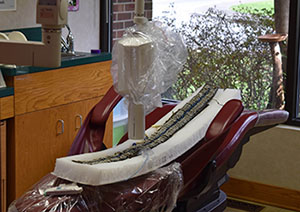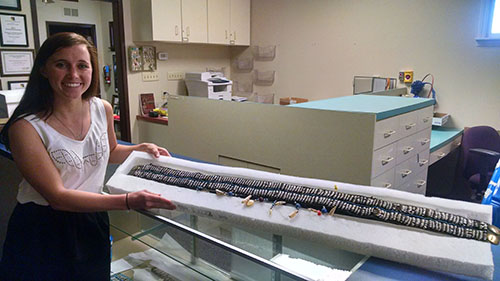WFU Honors Thesis Examines MOA Artifact
The Museum of Anthropology staff is excited to have new information about one of its artifacts thanks to the hard work of a Wake Forest student. This spring, senior Anthropology major Shannon O’Hanlon completed her honors thesis researching one of three Alaskan Yup’ik caribou teeth belt in the MOA’s ethnographic collection. Shannon developed an interest in the Museum, and the Yup’ik collection specifically, during a 2014 internship in which she worked to research, develop, and install The Yup’ik Way of Life: An Alaskan People in Transition, a unique exhibit that combined Yup’ik artifacts from the MOA with loaned photographs depicting Yup’ik life in the late 20th century.
The belt Shannon studied is part of the Museum’s Wachovia Historical Society collection and was originally collected by Moravian missionary John Kilbuck and his wife Edith in the late 19th century. The Yup’ik no longer produce this type of belt, but at that time they were worn by women and used in healing rituals. The caribou teeth were believed to chew or cut the sickness out of an ailing person.

The belt was x-rayed in a local dentist’s office.
As a part of her research, Shannon worked with local dentist and Wake Forest alumnus, Dr. Philip Golden (‘72), who provided the equipment to take x-rays of the teeth. There are 247 sets of teeth on the belt, for a total of nearly 2,000 individual teeth. All of the surprisingly small teeth are lower incisors, as caribou do not have upper incisors, only a hard bony plate that the lower teeth strike against.
Shannon’s analysis of the belt offers new insights regarding Yup’ik cultural values and material traditions, as well as bio-ecological aspects of Yup’ik hunting practices and their changes over time. Her work demonstrates that the belt is indicative of links between historical Yup’ik practices, caribou herd dynamics, and present-day Yup’ik concerns. Shannon found that the caribou represented in the belt were much healthier than those studied by modern researchers, despite Yup’ik hunting practices remaining largely the same. This suggests that hunting is not the driving factor in poor herd health. Poor herd health in modern populations is more likely due to larger environmental issues such as climate change and industrial development. Shannon’s research also examined the important role anthropology museums can play in preserving traces of bio-ecological systems through the conservation of material culture.

Shannon poses with the belt after successfully defending her thesis.
